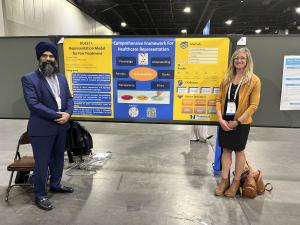Innovative Healthcare Representation Model, KUCETF, Unveiled at APHA 2023 Conference in Atlanta, Georgia
Navigating the Future of Healthcare with Knowledge, Understanding, and Ethical Representation
ATLANTA, GEORGIA, UNITED STATES OF AMERICA, November 14, 2023 /EINPresswire.com/ -- In a groundbreaking presentation at the American Public Health Association (APHA) 2023 Annual Meeting and EXPO in Atlanta, Georgia, healthcare professionals and academics gathered to witness the unveiling of the KUCETF framework — a revolutionary model designed to transform healthcare representation dynamics.Developed by Satpreet Singh and Dr. Carissa Smock from the School of Business and Economics at National University, the KUCETF model embodies the principles of Knowledge, Understanding, Clarity, Ethics, Transparency, and Fairness. This innovative framework promises to reshape the landscape of healthcare representation, ensuring fair treatment and quality care for patients across the nation.
Knowledge as the Keystone:
In the complex and ever-evolving world of healthcare, effective representation is paramount. The KUCETF model places knowledge at the forefront, acknowledging that a deep understanding of laws, regulations, and medical practices is the foundation for genuine representation. Singh and Smock emphasize four types of knowledge — factual, procedural, conceptual, and metacognitive — as essential components for building effective healthcare representation strategies.
The healthcare sector is dynamic, subject to constant changes in rules, regulations, and medical information. The KUCETF model addresses this challenge by offering a comprehensive guide to navigating the complexities of the healthcare landscape. By emphasizing the importance of knowledge, the model equips healthcare representatives with the tools needed to adapt to the evolving nature of the industry.
Understanding for Patient-Centric Care:
Beyond textbook knowledge, the KUCETF model recognizes the significance of understanding in healthcare representation. Understanding goes hand in hand with providing patient-centric care. It involves considering the unique circumstances, fears, and hopes of patients, enabling healthcare providers to make informed decisions and offer compassionate support when needed.
Understanding is crucial in building a robust patient-provider relationship and delivering high-quality care. The KUCETF model encourages healthcare representatives to go beyond surface-level knowledge, fostering a deeper understanding that is essential for creating positive patient experiences.
Transparency and Ethics for Trust-Building:
The patient-provider relationship is built on trust, a foundation established through clear communication, ethical principles, and transparency. Patients must be well-informed about their medical options and confident in the integrity of their healthcare representatives. The KUCETF model addresses this need by highlighting the importance of transparency in matters such as treatment plans, financial considerations, and patient outcomes.
Transparency fosters trust and empowers patients to make informed decisions about their healthcare journey. By integrating transparency and ethical considerations, the KUCETF model ensures that healthcare representatives operate with the utmost integrity, creating an environment where patients feel secure and respected.
A Comprehensive Approach to Healthcare Representation:
The KUCETF representation model is a comprehensive approach that goes beyond traditional frameworks. It not only ensures fairness, transparency, and compliance but also equips healthcare representatives with the tools to navigate the complex healthcare systems effectively. The model empowers patients to advocate for their health and well-being, contributing to the creation of a healthcare landscape characterized by fair treatment and transparent communication.
Unveiled at APHA 2023:
Satpreet Singh and Dr. Carissa Smock introduced the KUCETF framework at the APHA 2023 Annual Meeting and EXPO in Atlanta, Georgia, on November 13, 2023. This event provided a platform for healthcare professionals, researchers, and policymakers to explore the potential of the KUCETF model in addressing the challenges of the contemporary healthcare landscape.
The presentation showcased the model's practical applications in various healthcare settings, emphasizing its adaptability from the clinic to the national level. Attendees had the opportunity to engage with the developers, gaining insights into the model's development, its underlying principles, and its potential impact on healthcare representation.
Contributing to a Healthier Nation:
In their presentation, Singh and Smock expressed their aspirations for the KUCETF model to contribute to the creation of a healthier nation. By promoting fair treatment, transparent communication, and the highest ethical standards, the model aims to elevate the standard of healthcare representation across the country.
Through the lens of the KUCETF model, Singh and Smock envision a healthcare landscape where patients not only receive medical care but also experience the respect and fairness they deserve. The model serves as a compass, guiding healthcare representatives toward practices that prioritize the well-being of individuals and the integrity of healthcare institutions.
About the Authors:
Satpreet Singh and Dr. Carissa Smock are esteemed contributors to the field of healthcare representation. Satpreet Singh, associated with the School of Business and Economics at National University, can be reached at satpreetsingh@ymail.com. Dr. Carissa Smock, also from the School of Business and Economics at National University, can be contacted at csmock@nu.edu.
Rupinder Kaur
Khalsa News and Podcasts
+1 209-713-4040
email us here
Legal Disclaimer:
EIN Presswire provides this news content "as is" without warranty of any kind. We do not accept any responsibility or liability for the accuracy, content, images, videos, licenses, completeness, legality, or reliability of the information contained in this article. If you have any complaints or copyright issues related to this article, kindly contact the author above.

